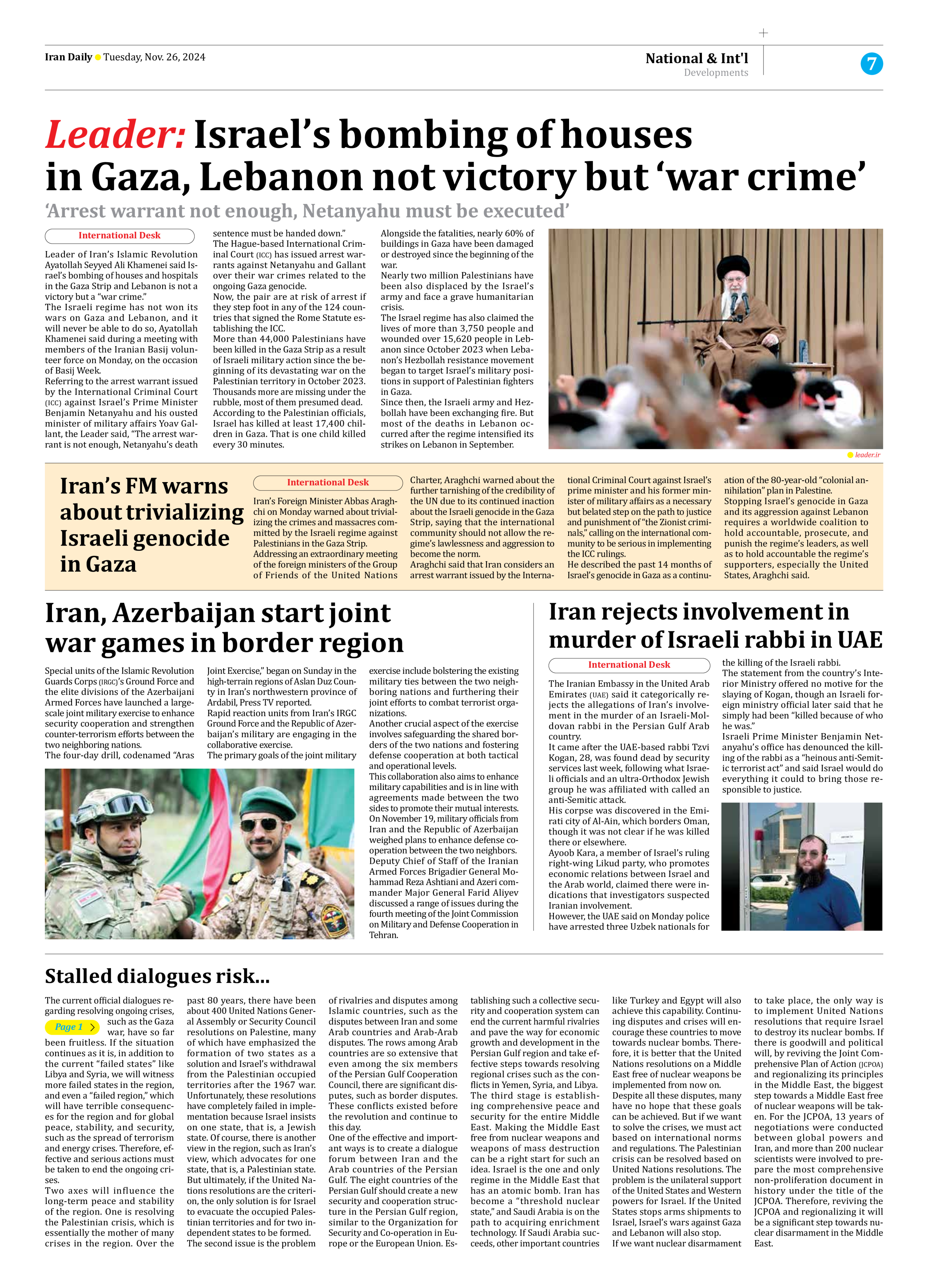
Stalled dialogues risk...
Page 1
The current official dialogues regarding resolving ongoing crises, such as the Gaza war, have so far been fruitless. If the situation continues as it is, in addition to the current “failed states” like Libya and Syria, we will witness more failed states in the region, and even a “failed region,” which will have terrible consequences for the region and for global peace, stability, and security, such as the spread of terrorism and energy crises. Therefore, effective and serious actions must be taken to end the ongoing crises.
Two axes will influence the long-term peace and stability of the region. One is resolving the Palestinian crisis, which is essentially the mother of many crises in the region. Over the past 80 years, there have been about 400 United Nations General Assembly or Security Council resolutions on Palestine, many of which have emphasized the formation of two states as a solution and Israel’s withdrawal from the Palestinian occupied territories after the 1967 war. Unfortunately, these resolutions have completely failed in implementation because Israel insists on one state, that is, a Jewish state. Of course, there is another view in the region, such as Iran’s view, which advocates for one state, that is, a Palestinian state. But ultimately, if the United Nations resolutions are the criterion, the only solution is for Israel to evacuate the occupied Palestinian territories and for two independent states to be formed.
The second issue is the problem of rivalries and disputes among Islamic countries, such as the disputes between Iran and some Arab countries and Arab-Arab disputes. The rows among Arab countries are so extensive that even among the six members of the Persian Gulf Cooperation Council, there are significant disputes, such as border disputes. These conflicts existed before the revolution and continue to this day.
One of the effective and important ways is to create a dialogue forum between Iran and the Arab countries of the Persian Gulf. The eight countries of the Persian Gulf should create a new security and cooperation structure in the Persian Gulf region, similar to the Organization for Security and Co-operation in Europe or the European Union. Establishing such a collective security and cooperation system can end the current harmful rivalries and pave the way for economic growth and development in the Persian Gulf region and take effective steps towards resolving regional crises such as the conflicts in Yemen, Syria, and Libya.
The third stage is establishing comprehensive peace and security for the entire Middle East. Making the Middle East free from nuclear weapons and weapons of mass destruction can be a right start for such an idea. Israel is the one and only regime in the Middle East that has an atomic bomb. Iran has become a “threshold nuclear state,” and Saudi Arabia is on the path to acquiring enrichment technology. If Saudi Arabia succeeds, other important countries like Turkey and Egypt will also achieve this capability. Continuing disputes and crises will encourage these countries to move towards nuclear bombs. Therefore, it is better that the United Nations resolutions on a Middle East free of nuclear weapons be implemented from now on.
Despite all these disputes, many have no hope that these goals can be achieved. But if we want to solve the crises, we must act based on international norms and regulations. The Palestinian crisis can be resolved based on United Nations resolutions. The problem is the unilateral support of the United States and Western powers for Israel. If the United States stops arms shipments to Israel, Israel’s wars against Gaza and Lebanon will also stop.
If we want nuclear disarmament to take place, the only way is to implement United Nations resolutions that require Israel to destroy its nuclear bombs. If there is goodwill and political will, by reviving the Joint Comprehensive Plan of Action (JCPOA) and regionalizing its principles in the Middle East, the biggest step towards a Middle East free of nuclear weapons will be taken. For the JCPOA, 13 years of negotiations were conducted between global powers and Iran, and more than 200 nuclear scientists were involved to prepare the most comprehensive non-proliferation document in history under the title of the JCPOA. Therefore, reviving the JCPOA and regionalizing it will be a significant step towards nuclear disarmament in the Middle East.







